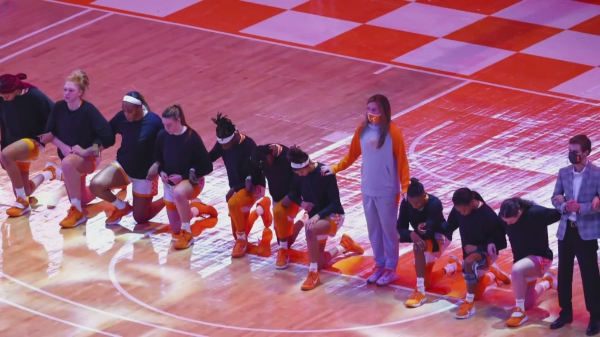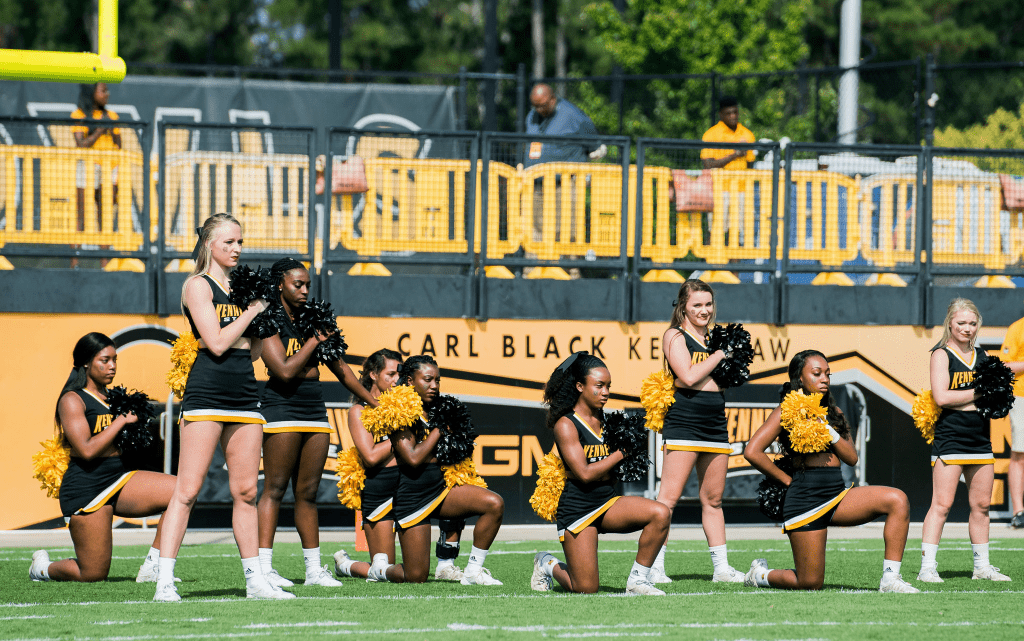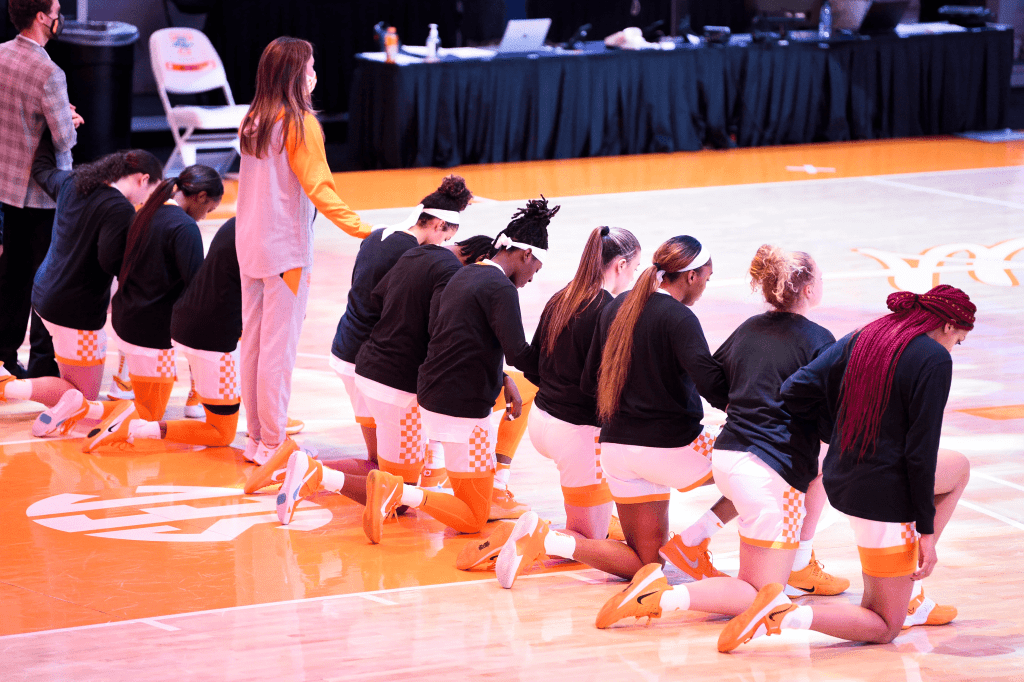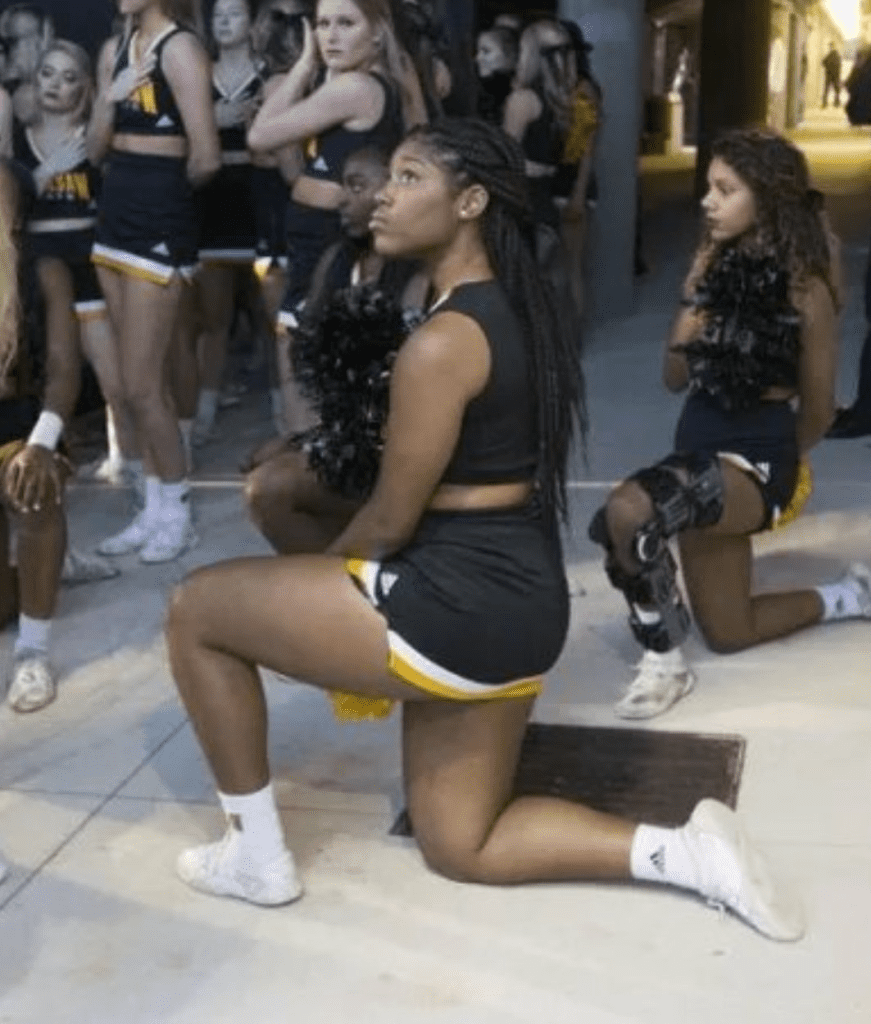Scholarships Pulled: University of Texas Students Removed After Kneeling During Anthem
The University of Texas (UT) is currently under intense scrutiny following reports that it revoked scholarships from five athletes who knelt during the National Anthem to protest racial injustice. This decision has ignited a fierce debate, positioning UT at the center of a national conversation about free expression, institutional rules, and the role of universities in social activism.

The Power of the Kneeling Protest
Kneeling during the National Anthem has become a powerful symbol of protest against racial injustice, a movement sparked by former NFL player Colin Kaepernick in 2016. What started as a solitary act of defiance has since evolved into a global movement, with athletes across various sports using this gesture to highlight racial inequalities and police violence. The UT athletes who chose to kneel were not just participating in a protest; they were aligning themselves with a broader movement demanding justice for marginalized communities.
Public Reaction: A Nation Divided
The reported revocation of scholarships by UT has sharply divided public opinion. Supporters of the athletes argue that their right to free expression should be protected, especially when it addresses critical social issues like racial injustice. They believe that punishing students for protesting is a direct attack on free speech and undermines the university’s mission to foster a diverse and inclusive environment.
On the other hand, critics of the athletes’ actions argue that kneeling during the National Anthem is disrespectful to the flag and those who have served the country. They support the university’s right to enforce its rules, contending that scholarships are conditional on adherence to team and institutional policies. From this perspective, the athletes’ protest is seen as a violation of these rules, justifying the revocation of their scholarships.
The University’s Dilemma: Balancing Free Expression and Institutional Rules
Universities are traditionally viewed as bastions of free thought and expression, where diverse perspectives are encouraged and debated. UT, with its long history of supporting a wide range of viewpoints, now finds itself in a particularly difficult position. The reported action against these athletes forces the university to navigate the delicate balance between upholding its institutional policies and honoring its commitment to freedom of expression. This dilemma raises important questions about the role of universities in supporting social activism while maintaining order and respect within their institutions.
Institutional Responses: Reflecting Core Values

The controversy at UT is not just about the revocation of scholarships; it is a reflection of broader societal tensions regarding how institutions respond to political and social activism. Should universities protect all forms of expression, even when they challenge established norms, or do they have the right to impose restrictions to maintain respect for certain symbols and traditions? The response to these questions will shape the future of academic and athletic policies across the country.
The Broader Societal Debate: Free Speech Versus Tradition
The backlash against UT’s decision has brought to the forefront a broader societal debate about the role of academic institutions in regulating political and social activism. On one hand, there is the argument that universities should be neutral grounds where all forms of expression are protected, allowing students to engage in activism without fear of retribution. On the other hand, some argue that universities have a responsibility to enforce respect for national symbols like the flag and the National Anthem, even if that means limiting certain forms of protest.
Setting a Precedent: The Impact of UT’s Decision

The way UT handles this controversy could set a significant precedent for how other educational institutions respond to similar situations in the future. If UT chooses to reinstate the scholarships, it could be seen as a commitment to supporting free expression and fostering open dialogue about racial injustice. Such a decision would send a strong message that the university values the voices of its students and encourages responsible activism. Conversely, if UT decides to uphold the revocation of scholarships, it could emphasize the importance of adhering to institutional rules and maintaining order, even at the cost of suppressing dissent.
The Role of Athletics in Social Movements
The involvement of athletes in social movements is not a new phenomenon, but it has gained renewed attention in recent years. Sports have always been a platform for raising awareness about social issues, from Muhammad Ali’s refusal to be drafted during the Vietnam War to the more recent Black Lives Matter protests in various sports leagues. The situation at UT highlights the unique position of athletes as both public figures and students, navigating the expectations of their teams, universities, and broader society.
Athletes as Agents of Change
The actions of the UT athletes demonstrate the powerful role that student-athletes can play as agents of change. By using their visibility and influence to draw attention to social issues, these athletes are challenging the traditional expectations placed on them. They are not just competitors on the field; they are advocates for justice, using their platform to push for meaningful change. This dual role complicates the university’s response, as it must consider both the athletic and social dimensions of the athletes’ actions.
Universities at a Crossroads: Defining the Future of Free Expression

As more students engage in activism, universities across the country find themselves at a crossroads. The decisions they make in response to these protests will define the future of free expression on campus. Will universities embrace their role as protectors of free speech, even when it is controversial, or will they prioritize institutional rules and traditions? The outcome of this debate will have lasting implications for how universities navigate the intersection of education, activism, and free expression.
Conclusion: UT’s Critical Decision
The University of Texas’s decision to revoke scholarships from athletes who knelt during the National Anthem has ignited a critical conversation about the role of free expression in academic institutions. As the debate continues, the actions taken by UT and other universities will shape the landscape of academic freedom and student activism for years to come. In this complex and evolving situation, one thing is clear: the balance between upholding institutional values and supporting the right to protest will be a defining challenge for universities in the 21st century.



